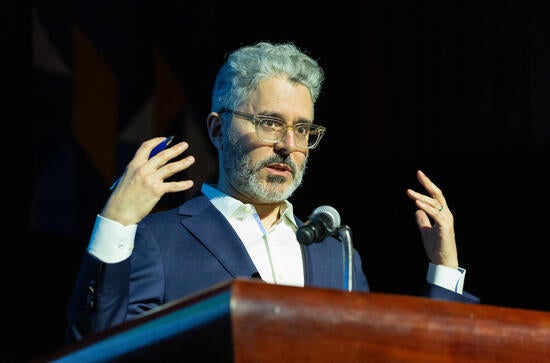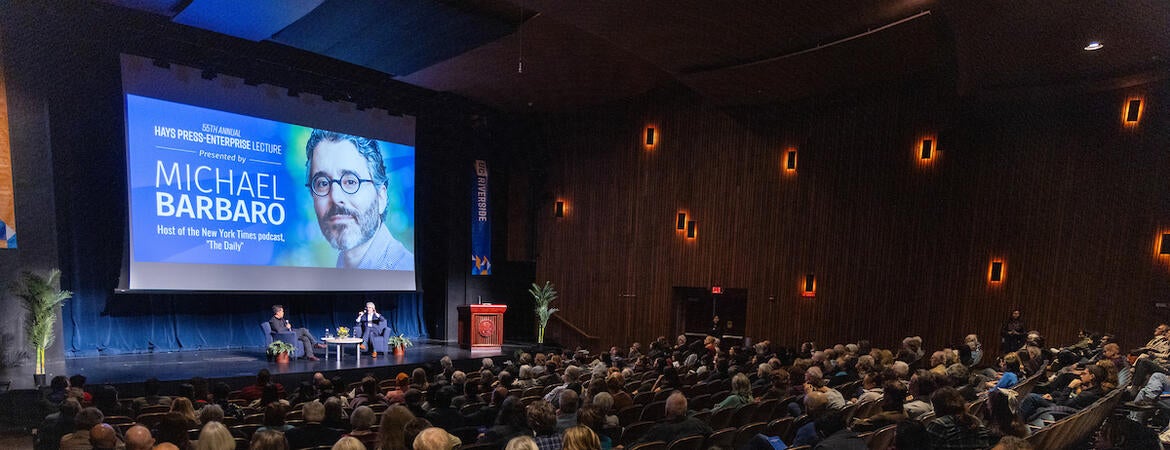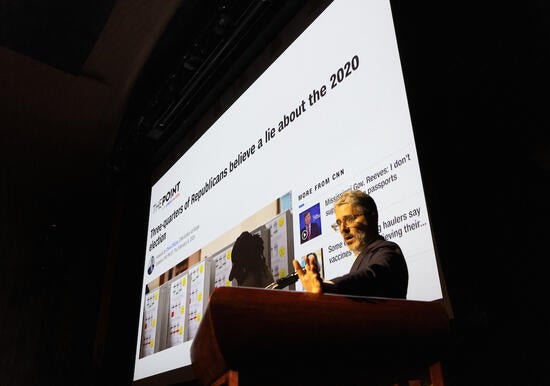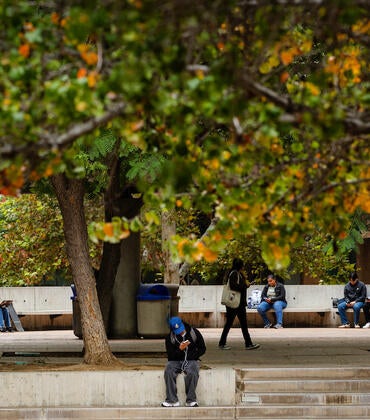An attempt to address the growing mistrust of the media by many Americans led to the creation of the popular podcast “The Daily,” according to New York Times journalist Michael Barbaro. Barbaro was speaking to students, staff, faculty, and community members Monday, March 4 at UC Riverside’s University Theatre.

Barbaro, who presented the 55th Annual Hays Press-Enterprise Lecture, said the five-days-a-week audio podcast was born into the “smoldering cauldron of distrust” of media at the start of the Trump presidency in 2017.
“Mistrust profoundly informed the way we thought about `The Daily,’” he said. “We took it as part of our mission to close that gap.”
Trump had labeled the media as “the enemy of the people,” a phrase Barbaro noted had been used in the past by dictators like Josef Stalin, Adolf Hitler, and Mao Tse-tung. Polls show that Republican voters increasingly view the media the same way, Barbaro said.
Those views have an impact not just on the media but society as a whole, Barbaro said. He cited the skepticism over COVID-19 vaccines and the legitimacy of the 2020 presidential election that led to the Jan. 6 attack on the U.S. Capitol.
“That is not just a crisis for the media” he said. “That is a crisis for our democracy and our civic life. That tells us the country no longer clings to anything that resembles a common set of facts.”
Their approach with the podcast is to show the story behind the story, talking to reporters about how they gathered information or hearing directly from those in the news about what they were experiencing, said Barbaro, who co-hosts the podcast with journalist Sabrina Tavernise. Instead of the authoritative “voice of God” in most print journalism, listeners could hear and decide for themselves, he said.
He played audio clips from shows as examples of how voices on the podcast are presented in different ways. One recent show featured an interview with a man in Gaza where an airstrike could be heard in the background. Another interview was with the owner of a gun shop who sold semi-automatic weapons used in a mass shooting where he described his anguish over learning that fact.
“It means that people are hearing complicated, messy stories in the complicated, messy ways they exist,” Barbaro said.
In its first year, “The Daily” grew to over one million listeners a day and now averages three million daily listeners, Barbaro said.
That audience, larger than that of some of the daily cable news programs, shows that people still want unvarnished truths and rigorous journalism, he said. Barbaro noted that many other news organizations have followed the New York Times’ model and created similar podcasts.
He cited that as progress while acknowledging that mistrust in the media continues to grow and is likely to grow more polarized in the 2024 presidential election.
Barbaro ended his talk with a request to “not give upon on the truth, not give up on an idea there is a media worth fighting for, there are subscriptions worth paying for. There is a democracy very much at stake if we don’t come out the other side.”
Following his talk, Barbaro took questions from the audience with UCR philosophy professor Barry Lam moderating. During his campus visit, Barbaro also met with students earlier in the day where he took questions on the New York Times’ coverage of issues including Israel and the war in Gaza.
The Hays Press-Enterprise Lecture Series was established in 1966 by Howard H. “Tim” Hays Jr., then-editor of The Press-Enterprise, in collaboration with UC Riverside. His son, Tom Hays, created an endowment fund to ensure the lecture’s tradition lived on after his father’s death in 2011.
The lecture series seeks to present notable journalists to address important topics. In recent years, presenters have included broadcast journalist Soledad O’Brien, formerly of CNN, New York Times journalist Nikole-Hannah Jones, and then-Los Angeles Times Executive Editor Kevin Merida.





